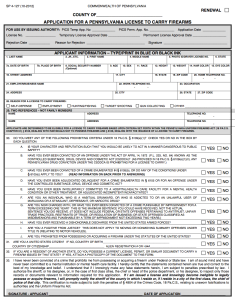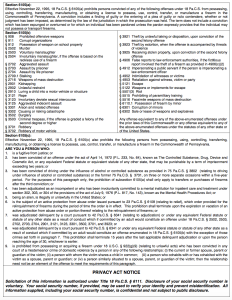Can I get a license to carry a concealed firearm in Pennsylvania?
Pennsylvania has a rich history of gun ownership. It was one of the original 13 colonies after all.
Before there was the 2nd Amendment to the United States Constitution, there was Article 1 Section 21 of the Pennsylvania Declaration of Rights (the Pennsylvania Constitution of 1776). Contained in Article 1 Section 21 were the most strongly worded phrases that have ever been written anywhere when it comes to law abiding citizens and gun rights. Article 1 Section 21 of 1776 formed the idea of most other state constitutions when it comes to gun rights and also our Federal concepts that was enshrined as the Second Amendment. The Second Amendment was adopted on December 15, 1791, as part of the first ten amendments comprising the Bill of Rights. The Pennsylvania Declaration of Rights was published in 1776.
Pennsylvanians hold an ancient right to gun ownership.
Just consider these words of Article 1 Section 21 as it exists now:
The right of the citizens to bear arms in defense of themselves and the State shall not be questioned.
Those 19 words form the basis of the power that we as citizens have. However, sometimes the government or others do not fully recognize this ancient right. It is an important right.
It is from this ancient history that all those in Pennsylvania get their current right to possess and own and use firearms.
In large part of this history and tradition, Pennsylvania is a “shall issue” state. In the US, there are four types of states when it comes to the issuance of a license to carry a concealed firearm: unrestricted (constitutional) carry, may issue, shall issue, and no issue (Washington DC was the last no-issue state and seems to be trying to head back that way despite, and for all intents and purposes some areas of some states are no issue by way of practice).
Pennsylvania is a shall issue state
A license to carry firearms, allowing for concealed carry on your person or in your vehicle is easy to come by. There are no classes or guns safety courses or range shoot qualifications that you have to go through. You have to be over the age of 21. Pennsylvania is a “shall issue” state, so unless you are within a certain class of restricted persons (people who cannot lawfully possess a firearm), you will be eligible for a Pennsylvania License to Carry Firearms.
You can find the Sheriff’s actions in terms of what is to be done in 18 PaCSA 6109:
| (d) Sheriff to conduct investigation.–The sheriff to whom the application is made shall: | ||
| (1) investigate the applicant’s record of criminal conviction; | ||
| (2) investigate whether or not the applicant is under indictment for or has ever been convicted of a crime punishable by imprisonment exceeding one year; [Blogger’s note: N.B. that Section 6102 of the Uniform Firearms Act defines “Crime punishable by imprisonment exceeding one year.” The term does not include any of the following: (1) Federal or State offenses pertaining to antitrust, unfair trade practices, restraints on trade or regulation of business. (2) State offenses classified as misdemeanors and punishable by a term of imprisonment not to exceed two years. So it would require a conviction or accusation of a Pennsylvania misdemeanor of the second degree or higher.] | ||
| (3) investigate whether the applicant’s character and reputation are such that the applicant will not be likely to act in a manner dangerous to public safety; | ||
| (4) investigate whether the applicant would be precluded from receiving a license under subsection (e)(1) or section 6105(h) (relating to persons not to possess, use, manufacture, control, sell or transfer firearms); and | ||
| (5) conduct a criminal background, juvenile delinquency and mental health check following the procedures set forth in section 6111 (relating to sale or transfer of firearms), receive a unique approval number for that inquiry and record the date and number on the application. | ||
| (e) Issuance of license.– | ||
| (1) A license to carry a firearm shall be for the purpose of carrying a firearm concealed on or about one’s person or in a vehicle and shall be issued if, after an investigation not to exceed 45 days, it appears that the applicant is an individual concerning whom no good cause exists to deny the license. A license shall not be issued to any of the following: | ||
| (i) An individual whose character and reputation is such that the individual would be likely to act in a manner dangerous to public safety. | ||
| (ii) An individual who has been convicted of an offense under the act of April 14, 1972 (P.L. 233, No. 64), known as The Controlled Substance, Drug, Device and Cosmetic Act. | ||
| (iii) An individual convicted of a crime enumerated in section 6105. | ||
| (iv) An individual who, within the past ten years, has been adjudicated delinquent for a crime enumerated in section 6105 or for an offense under The Controlled Substance, Drug, Device and Cosmetic Act. | ||
| (v) An individual who is not of sound mind or who has ever been committed to a mental institution. | ||
| (vi) An individual who is addicted to or is an unlawful user of marijuana or a stimulant, depressant or narcotic drug. | ||
| (vii) An individual who is a habitual drunkard. | ||
| (viii) An individual who is charged with or has been convicted of a crime punishable by imprisonment for a term exceeding one year except as provided for in section 6123 (relating to waiver of disability or pardons). | ||
| (ix) A resident of another state who does not possess a current license or permit or similar document to carry a firearm issued by that state if a license is provided for by the laws of that state, as published annually in the Federal Register by the Bureau of Alcohol, Tobacco and Firearms of the Department of the Treasury under 18 U.S.C. § 921(a)(19) (relating to definitions). | ||
| (x) An alien who is illegally in the United States. | ||
| (xi) An individual who has been discharged from the armed forces of the United States under dishonorable conditions. | ||
| (xii) An individual who is a fugitive from justice. This subparagraph does not apply to an individual whose fugitive status is based upon nonmoving or moving summary offense under Title 75 (relating to vehicles). | ||
| (xiii) An individual who is otherwise prohibited from possessing, using, manufacturing, controlling, purchasing, selling or transferring a firearm as provided by section 6105. | ||
| (xiv) An individual who is prohibited from possessing or acquiring a firearm under the statutes of the United States. | ||
Federally the prohibitions for issuance of a license to carry a concealed firearm are found in the Arms Export Control Act (AECA) prohibits the issuance of licenses to persons who have been convicted of:
- Section 38 of the AECA, 22 USC 2778;
- Section 11 of the Export Administration Act of 1979, 60 USC App. 2410;
- Sections 7903, 794, or 798 of Title 18, USC, relating to espionage involving defense or classified information;
- Section 16 of the Trading with the Enemy Act, 50 USC App. 16;
- Section 30A of the Securities Exchange Act of 1934, 15 USC 78dd-1, or section 104 of the Foreign Corrupt Practices Act, 15 USC 78dd-2;
- Chapter 105 of Title 18, USC, relating to sabotage;
- Section 4(b) of the Internal Security Act of 1950, 50 USC 783(b), relating to communication of classified information;
- Sections 57, 92, 101, 104, 222, 224, 225, or 226 of the Atomic Energy Act of 1954, 42 USC 2077 2122, 2131, 2234, 2272, 2275, and 2276;
- Section 601 of the National Security Act of 1947, 50 USC 421, relating to the protection of the identity of undercover intelligence officers, agents, and other sources;
- Section 371 of Title 17, USC, when it involves conspiracy to violate any of the above statutes; and
- International Emergency Economic Powers Act, 50 USC 1702 and 1705.
Here is what the standard statewide form looks like:


